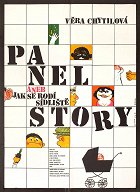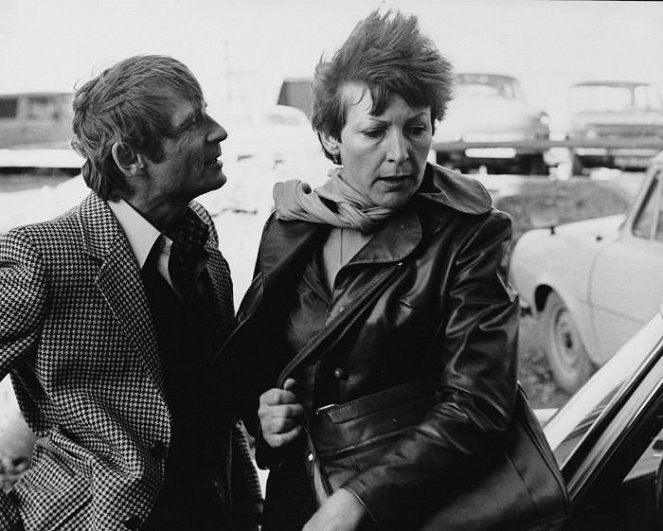Geschichte der Wände oder Wie eine Siedlung entsteht
(Festivaltitel)-
Panelstory aneb Jak se rodí sídliště (mehr)
Regie:
Věra ChytilováKamera:
Jaromír ŠofrMusik:
Jiří ŠustBesetzung:
Antonín Vaňha, Lukáš Bech, Eva Kačírková, Jiří Kodet, Alena Rýcová, Michal Nesvadba, Oldřich Navrátil, Miluše Šplechtová, Bronislav Poloczek (mehr)Inhalte(1)
Am Rande von Prag entsteht eine Neubausiedlung. Noch sind die Bauarbeiten nicht abgeschlossen, doch die Wohnungen werden bereits bezogen. Zwischen Betonblöcken, dröhnenden Baumaschinen und Schlammgruben verzweigen sich provisorische Bretterwege. Auf ihnen balancieren die Bewohner, wenn sie ihren Besorgungen nachgehen. Und mehr schlecht als recht beginnt sich der Alltag im Provisorium einzurichten. Mitten im Chaos versucht sich ein Taxifahrer zu orientieren – doch niemand kennt die von ihm gesuchte Straße. Im Fond des Taxis sitzt Großvater Honda, der im neuen Viertel seine Kinder und Enkelkinder besuchen will. Der alte Mann kommt vom Dorf, was ihm hier begegnet, kann er nur schwer einordnen. Immer wieder werden seine Wege von einem kleinen Jungen gekreuzt. Pepík scheint sich in dem Durcheinander ausgesprochen wohl zu fühlen. Mehr noch, mit Vorliebe greift er in ohnehin schon schwierige Situationen ein und macht sie noch komplizierter. Pepík und Opa Honda sind die gegensätzlichen Fixpunkte in einem Gewirr zwischenmenschlicher Verquickungen, die sich vor dem Hintergrund der halbfertigen Großbaustelle entfalten. (Berlinale)
(mehr)Kritiken (4)
Eine hervorragende Satire, in der sich neben dem Abbild der schlammigen Gemeinschaft sowie dem Normalisationsmarasmus auch die typischen Elemente, wie wir auch die von der tschechischen Regisseurin "Chytilová" kennen, durchsetzen, insbesondere die einfache Natur der Beziehungen zwischen den gegenseitigen Geschlechtern. Etwas unausgewogen muten da die authentischen Elemente in Verbindung mit der deutlich stilisierten Parodie (die Rolle des Kodeš, gespielt vom tschechischen Schauspieler Kodet) an, als ob Chytilová die Realität der Plattenbauten hin und wieder als nicht genügend aussagekräftig betrachten würde und das Bedürfnis verspürte, sie mit komödialen Elementen hervorzuheben. Aus dem Blickwinkel einer Interpretation der entstehenden Normalisierungszeit ist dies jedoch eine absolute Schlüsselarbeit.
()
Věra Chytilová films this in a way as if she wanted to make up for everything after a 20-year fast, and fills the screen with a multitude of characters, motifs, and plots. If there were only half as many, it could work in principle, but like this, the film just hyperactively jumps from scene to scene, and the viewer gets the impression that the director and cameraman must have been on methamphetamine. I don't get a good feeling from the nervous camera or the emotionally overexposed performances of the film's characters. I would like to say that the film authentically captures the atmosphere of a large housing estate in the 70s, but that would not be true. The film is somehow hysterical, and it should have been to be toned down. I understand that when it came out it must have seemed like a revelation to the audience because no one was prepared for the level of criticism that Chytilová worked with. That's where her strength lies. She was not afraid to open topics that everyone else was silent about, and we must realize that she was filming shortly after important historical Czech trials. The social atmosphere was certainly not inclined toward open artistic expression. Overall impression: 40%.
()
Good old Věra. No one could have handled this topic more aptly than her, because the collective stream in the park among the mud and apartment blocks is something so absurd and yet so familiar to most Czechs. Personally, I see Story from a Housing Estate as a free generational continuation of the film Naše bláznivá rodina by Valášek and Kachyňa, who portrayed the contemporary Czech character in the heyday of the sixties completely outside of all those intellectual currents that never really bothered the larger population anyway. A typical Czech family will always be more interested in whether mom has lost her glasses somewhere, whether the older daughter supervised the younger one while she was going on a date, and if this household lived in the center of Prague at the time, it was a pity that in the next decade, it had to move these interests to nice panel housing estates. Schulhoff turned the subject into a comedy, and Chytilová made it into an unadorned satire. And she and Kačírková even added a neo-feminist view of interpersonal relations. So cheers to the formica core and maternity leave!
()
Eine Komödie mit Handlung sucht man in diesem Film vergeblich. Ein guter zeitgenössischer Dokumentarfilm - der Regisseur hat es geschafft, dies perfekt einzufangen, und der Film ist ziemlich einzigartig. Aus der Sicht des Genres Komödie ist er ein totaler Flop, ich gebe ihm 2 Sterne für sein originelles Konzept und die realistische Darstellung der damaligen Zeit.
()

